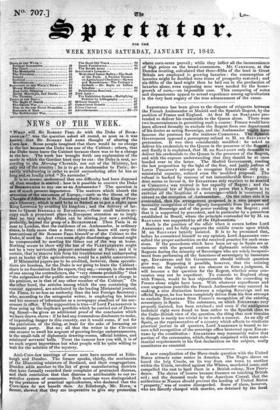Importance has been given to the dispute of etiquette between
the French Ambassador at Madrid and the Spanish Regent, by the position of France and England. At first M. DE SALVANDY pre- tended to deliver his credentials to the Queen alone. There were two inconveniences in permitting such a course: France would have been allowed formally to exclude the Regent from one department
of his duties as acting Sovereign, and the Ambassador might have become the postman for the traitress CHRISTINA. The Spanish Government opposed a peremptory refusal to M. DE SALVANDY'S pretension. It was then considerably modified : lie asked to deliver his credentials to the Queen in the presence of the Regent ; and finally it is explained, that M. nu SALVANDY only demands to deliver his credentials to the Queen in the presence of the Regent, and with the express understanding that they should be at once handed over to the latter. The Madrid Government, reading the last proposition by the light of the first, and justly jealous of Louis PHILIPPE'S attempt to recognize ESPARTERO only in a ministerial capacity, refused even the modified proposal. The refusal is backed by reasons of not inconsiderable force : prece- dent seems to favour it, for ESPARTERO only requires to be treated as CHRISTINA was treated in her capacity of Regent ; and the constitutional law of Spain is cited to prove that a Regent is to exercise all the- functions of a sovereign—which is construed to extend to the reception of Ambassadors.- On the other side it is contended, that the arrangement proposed is a very proper and necessary recognition of the dignity inseparable from the person of the real Sovereign and of the power residing in the Regent ; and that it is supported by precedent, and in particular by a precedent established in Brazil, where the principle contended for by M. BE SALVANDY was supported by all the Diplomatists. Such is the position of the affair when it comes before Lord ABERDEEN; and he fully supports the middle course upon which M. DE SALVANDY latterly insisted. It is to be presumed that, before he committed himself to aoy opinion, Lord ABERDEEN con- sulted the proper authorities on the received practice for such occa- sions. If the precedents which have been set up in Spain are at variance with the general custom of diplomatic relations with Regents during the minority of Sovereigns who are solely incapaci- tated from performing all the functions of sovereignty by immature age, ESPARTERO and his Government should without question give way. Supposing it possible, however, that the existing records on the subject are too obscure to form a judgment, it will become a fair question for the Regent, whether some con- cession may not be expedient. To concede to England along with France, would be less objectionable than the conceding to France alone might have been. With whatever superfluous and even ungracious punctilio the French Ambassador may succeed in making a nice distinction between a reigning Sovereign and an official Regent, he has been completely driven from his first attempt to exclude ESPARTERO from France s recognition of the existing sovereignty in Spain. The substance, on which ESPARTERO very properly insisted, has been retained ; and even if the ambiguous technical right were found to lean rather to the Spanish than to the Gallo-British view of the question, the thing that now remains in dispute is surely too trivial to be worth a contest. As an ally of Spain, as the representative of a country which affects to vindicate practical justice in all quarters, Lord ABERDEEN is bound to in- sure a full recognition of the sovereign office bestowed upon ESPAR- TERO by the constitution : ESPARTERO may reasonably waive that portion of the ceremonies, which, though conjoined with more sub- stantial requirements in his first declaration on the subject, really constitutes no essential.


























